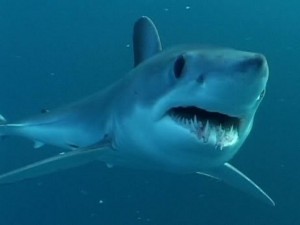 The world of fisheries management is so full of laws and regulations that it’s no wonder many fishermen feel persecuted by the government. That’s why I was pleasantly surprised to see the National Marine Fisheries Service trying something new.
The world of fisheries management is so full of laws and regulations that it’s no wonder many fishermen feel persecuted by the government. That’s why I was pleasantly surprised to see the National Marine Fisheries Service trying something new.
Shortfin mako sharks, close relatives of the great white, have seen their populations drop by over 50% since the 1950’s. Though there is a small targeted mako fishery, one of the leading causes of this decline is bycatch from the pelagic tuna and swordfish longline fishery and from recreational fishermen.
Last week, the National Marine Fisheries Service introduced a voluntary release program for mako sharks:
“Overfishing is occurring on the population of shortfin mako sharks in the North Atlantic Ocean. This means that shortfin mako sharks are being caught and retained at a rate that could be damaging to the long-term sustainability of the population. If you catch a shortfin mako shark that is in good condition, release it alive to reduce the number of sharks that are removed from the population. By doing this, you can help maintain a healthy shortfin mako population for future generations…Strong recreational and commercial fisheries rely on thriving fish populations. If shortfin mako sharks become overfished, regulations may be necessary to limit the commercial and recreational fishing in order for the population to recover. Releasing a shortfin mako today may help keep the population and fishery strong for years to come.” Source
NMFS isn’t just asking fishermen to release accidentally-caught shortfin makos unharmed. They’re also asking fishermen to report information about the sharks they’ve caught into a Google Maps interface that allows scientists, fishermen, and any interested members of the public to learn more about these animals. Additionally, this project will (hopefully) give fishermen a stake in the conservation of makos and a sense of ownership in the research.

Some shark scientists and conservationists are skeptical about the effectiveness of this voluntary release program:
“Makos have possibly the highest-value meat of any bycaught shark, and are a relatively regular bycatch among tuna and swordfish longliners. They are also very popular among sport fishermen”- Chuck Bangley
I’m cautiously optimistic and am waiting to see how effective this program will be before rendering a final judgement. If current population declines continue, new regulations will be needed to protect this species, but reducing fishing pressure without instituting new rules has the potential to be a great model for future conservation work.
I like the idea of treating fishermen with respect. The messages are 1) You are smart enough to see that this is a bad idea, and 2) You are not malicious or irresponsible by nature. It’s less the way a parent would talk to a child, and more the way one would speak to a colleague. I’m curious to see how effective this approach will be.
Really–The US has used the cover of ICCAT since 2008 to do basically nothing to protect these sharks, now they are going to just ask fishermen to let these valuable sharks go even thought they have a slot limit. Boy, I am sure that will work great and bring these guys back. Every year they pretend to try at ICCAT and I will bet nothing on Mako will come this year again. I also love what they are planning on doing for hammerheads and OWT.
Actually scalloped hammerheads have officially been declared overfished by NMFS (http://www.underwatertimes.com/news.php?article_id=09483612571), which pretty much mandates that they do something about it. They may not ban fishing for the species altogether, but I’d certainly expect to see much lower trip limits and possibly even a temporarily closed fishery. Bycatch remains a big problem for hammerheads though.
Regarding makos, as Dave quoted me above, I’d like to think that asking politely and making fishermen a part of a voluntary research project is a good effort, and for something less valuable like blue sharks or spiny dogfish it might even work (my lab works fairly often with commercial fishermen on dogfish research). That said, I don’t see the economics adding up that well for releasing makos. I hope it helps, but I’ll wait and see.